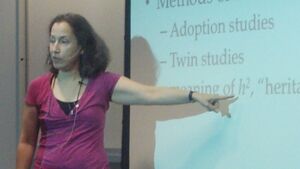Difference between revisions of "Martha Farah"
(desc) |
(unstub) |
||
| Line 2: | Line 2: | ||
|wikipedia=https://en.wikipedia.org/wiki/Martha_Farah | |wikipedia=https://en.wikipedia.org/wiki/Martha_Farah | ||
|amazon=https://www.amazon.com/Martha-J.-Farah/e/B001IXPV6Q | |amazon=https://www.amazon.com/Martha-J.-Farah/e/B001IXPV6Q | ||
| − | |interests=poverty, neuroethics | + | |interests=poverty, neuroethics,neuroscience |
| − | |description=US | + | |description=US neuroscientist who attended the [[2008 Bilderberg]]. |
|nationality=American | |nationality=American | ||
| + | |alma=_mater=MIT,Harvard University | ||
|birth_date=30 August 1955 | |birth_date=30 August 1955 | ||
| + | |image=Martha Farah.jpg | ||
|birth_place= | |birth_place= | ||
|death_date= | |death_date= | ||
| Line 11: | Line 13: | ||
|constitutes=academic | |constitutes=academic | ||
}} | }} | ||
| − | '''Martha Farah''' has studied the impact of socioeconomic influences, such as [[poverty]] on the brain. She has also looked at the effects of brain-enhancing [[drugs]].<ref>http://www.cnn.com/2013/06/13/health/martha-farah-brain/index.html</ref> | + | '''Martha Farah''' is director of the centre for neuroscience and society at the [[University of Pennsylvania]].<ref>https://www.theguardian.com/science/2012/oct/14/childhood-stimulation-key-brain-development</ref> |
| + | |||
| + | ==Research== | ||
| + | She was an early and influential participant in the field of neuroethics, the study of the societal and ethical implications of [[neuroscience]]. She was one of the founders of the [[International Neuroethics Society]] in [[2006]].<ref>http://www.neuroethicssociety.org/history</ref> | ||
| + | |||
| + | She has studied the impact of socioeconomic influences, such as [[poverty]] on the brain. She has also looked at the effects of brain-enhancing [[drugs]].<ref>http://www.cnn.com/2013/06/13/health/martha-farah-brain/index.html</ref> Her studies on the topics of mental imagery, [[face recognition]], reading, and attention "have become classics in the field".<ref>https://www.brainfacts.org/authorbiography?id=%7BA1736535-73DD-4281-9FAC-88BDBBC5494D%7D</ref> | ||
| + | |||
| + | At the time of the [[Bilderberg/2008|2008 Bilderberg meeting]], she was most known for her research on poverty's effects on the brain, the stunting of brain development in children of low socioeconomic backgrounds, and how poverty passes from generation.<ref>http://www1.udel.edu/PR/UDaily/2007/dec/brain120806.html</ref><ref>http://edition.cnn.com/2013/06/13/health/martha-farah-brain/index.html</ref><ref>https://www.economist.com/science-and-technology/2009/04/02/i-am-just-a-poor-boy-though-my-storys-seldom-told</ref> | ||
| + | |||
{{SMWDocs}} | {{SMWDocs}} | ||
==References== | ==References== | ||
{{reflist}} | {{reflist}} | ||
| − | |||
Latest revision as of 08:23, 3 January 2022
(academic) | |
|---|---|
 | |
| Born | 30 August 1955 |
| Nationality | American |
| Interests | • poverty • neuroethics • neuroscience |
US neuroscientist who attended the 2008 Bilderberg. | |
Martha Farah is director of the centre for neuroscience and society at the University of Pennsylvania.[1]
Research
She was an early and influential participant in the field of neuroethics, the study of the societal and ethical implications of neuroscience. She was one of the founders of the International Neuroethics Society in 2006.[2]
She has studied the impact of socioeconomic influences, such as poverty on the brain. She has also looked at the effects of brain-enhancing drugs.[3] Her studies on the topics of mental imagery, face recognition, reading, and attention "have become classics in the field".[4]
At the time of the 2008 Bilderberg meeting, she was most known for her research on poverty's effects on the brain, the stunting of brain development in children of low socioeconomic backgrounds, and how poverty passes from generation.[5][6][7]
Event Participated in
| Event | Start | End | Location(s) | Description |
|---|---|---|---|---|
| Bilderberg/2008 | 5 June 2008 | 8 June 2008 | US Virginia Chantilly | The 56th Bilderberg, Chantilly, Virginia, 139 guests |
References
- ↑ https://www.theguardian.com/science/2012/oct/14/childhood-stimulation-key-brain-development
- ↑ http://www.neuroethicssociety.org/history
- ↑ http://www.cnn.com/2013/06/13/health/martha-farah-brain/index.html
- ↑ https://www.brainfacts.org/authorbiography?id=%7BA1736535-73DD-4281-9FAC-88BDBBC5494D%7D
- ↑ http://www1.udel.edu/PR/UDaily/2007/dec/brain120806.html
- ↑ http://edition.cnn.com/2013/06/13/health/martha-farah-brain/index.html
- ↑ https://www.economist.com/science-and-technology/2009/04/02/i-am-just-a-poor-boy-though-my-storys-seldom-told